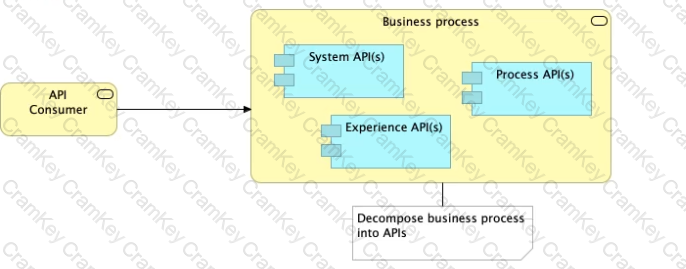| Exam Name: | MuleSoft Certified Platform Architect - Level 1 | ||
| Exam Code: | MCPA-Level-1 Dumps | ||
| Vendor: | MuleSoft | Certification: | MuleSoft Certified Platform Architect |
| Questions: | 152 Q&A's | Shared By: | destiny |
Refer to the exhibit.

What is the best way to decompose one end-to-end business process into a collaboration of Experience, Process, and System APIs?
A) Handle customizations for the end-user application at the Process API level rather than the Experience API level

B)Allow System APIs to return data that is NOT currently required by the identified Process or Experience APIs

C)Always use a tiered approach by creating exactly one API for each of the 3 layers (Experience, Process and System APIs)

D)Use a Process API to orchestrate calls to multiple System APIs, but NOT to other Process APIs

An Order API must be designed that contains significant amounts of integration logic and involves the invocation of the Product API.
The power relationship between Order API and Product API is one of "Customer/Supplier", because the Product API is used heavily throughout the organization and is developed by a dedicated development team located in the office of the CTO.
What strategy should be used to deal with the API data model of the Product API within the Order API?
Refer to the exhibit.

what is true when using customer-hosted Mule runtimes with the MuleSoft-hosted Anypoint Platform control plane (hybrid deployment)?
An organization wants MuleSoft-hosted runtime plane features (such as HTTP load balancing, zero downtime, and horizontal and vertical scaling) in its Azure environment. What runtime plane minimizes the organization's effort to achieve these features?